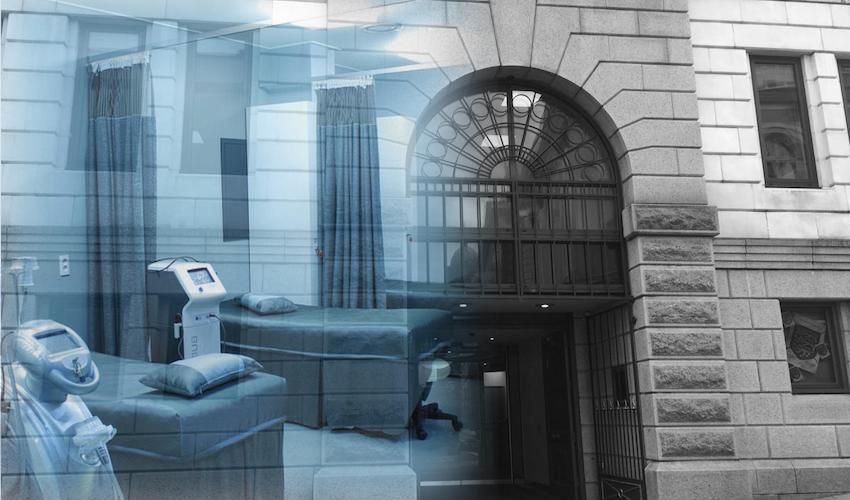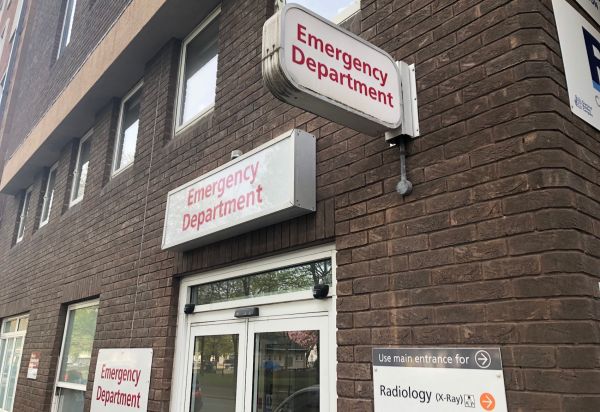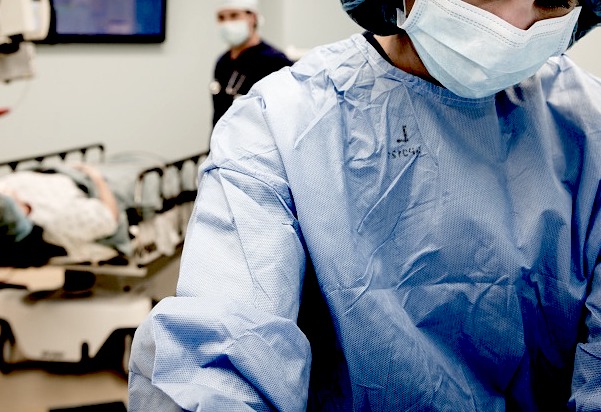

The death of an elderly woman who suffered a fatal stroke after a complication during emergency stomach surgery has prompted the Health Department to make significant changes, a ‘medical misadventure’ inquest has heard.
The day-long inquest surrounding the death of 77-year-old Patricia Elsie Renouf née Holmes heard extensive evidence from a number of witnesses in Morier House yesterday detailing the elderly lady’s collapse, admission to Hospital, diagnosis, emergency surgery and ultimate passing.
Her death – arising from the misplacement of a surgical tube during an emergency stomach operation – has triggered several operational changes in the Health Department.
Mrs Renouf suffered from chronic stomach problems which her GP told the Inquest caused her much difficulty and that the “symptoms have been dragging on for several years.”

Pictured: Patricia Renouf's GP gave evidence at her Inquest about her long-standing stomach problems.
The ongoing stomach issues culminated in an unfortunate incident in the early hours of 8 February last year which resulted in her collapse at home – prompting her husband to call an ambulance.
The Inquest called hours’ worth of evidence from medical practitioners – specialists, consultants and surgeons – who explained their input to Mrs Renouf’s care both prior to and during her admission to Hospital last year.
Each of the witnesses expressed their condolences to Mrs Renouf’s family, some of whom were present at the hearing which aimed to establish how she came by her death. The family were represented by Advocate David Benest and Advocate Beverley Lacey appeared on behalf of the Health Minister.
The Inquest heard how Mrs Renouf had previously suffered with a stomach ulcer, but when she was admitted to the Hospital – after initial rehydration treatment – she wasn’t presenting conventional symptoms associated with this condition.

Pictured: The quality of Mrs Renouf's care was questioned at the Inquest surrounding her death.
Karkala Pai – the surgeon who performed the emergency operation on Mrs Renouf – said that when he first examined her, he “wasn’t sufficiently convinced there was evidence of perforation” and attempted to find a definitive diagnosis before recommending surgery.
After Mrs Renouf’s condition deteriorated suddenly, the decision was taken to take her into surgery, but several issues were highlighted at the Inquest including being unable to immediately contact a senior member of staff to attend to Mrs Renouf, and the lack of an available operating theatre.
When asked by Relief Coroner Dr Martin Barrett if it was true that there “wasn’t someone of [his] immediate seniority to attend absolutely immediately,” Mr Pai admitted that that was indeed the case.
Mrs Renouf ultimately went in for surgery 12 hours after she was admitted to the Emergency Department.

Pictured: The 77-year-old was taken to surgery 12 hours after she was admitted to the Emergency Department.
Another surgeon consulted in Mrs Renouf’s case highlighted the difficulty presented by the practicalities of having “just one emergency theatre.”
Consultant Vascular Surgeon Gerard Williams says that this puts “a lot of pressure on one operating theatre” when “demand for that one limited resource peaks” as it did on this particular afternoon in February of last year.
“There are the practical issues that we face,” Mr Williams remarked.
The Inquest also heard from Staff Grade Anaesthetist Dr Carneiro originally tasked with inserting the catheter to administer medicine to the patient during the emergency surgery, who said that in her 35-year career she has inserted “probably more than 500” catheters.
Dr Carneiro described the procedure as “a difficult puncture” and, normally the patient is placed in a face down position to make locating the correct vein easier, but this was not possible as “the patient was already being operated on.”
The Anaesthetist explained that, after putting in a “guide wire” to mark where the catheter should go, she “attempted to insert the catheter” but that there was an “abnormally high resistance to its progression.”

Pictured: The wife and mother suffered a stroke after undergoing emergency stomach surgery.
Therefore, she said, she told the Anaesthesia and Intensive Medicine Consultant Dr Alun Roberts that she was “not happy to continue due to the high level of resistance,” which prompted him to take over the procedure and insert the catheter himself.
After surgery, which discovered that Mrs Renouf had indeed suffered a perforated ulcer in her intestine, Dr Carneiro ordered an emergency chest X-ray to check the position of the catheter and it became clear that it had been inserted into the carotid artery rather than the jugular vein.
It was this puncture, and the fact that drugs had been administered via this catheter, which caused Mrs Renouf to suffer a fatal stroke.
Dr Alun Roberts, apologised to the family, “I’m really, really sorry this has happened,” and also told the Inquest that, since this incident, the manufacturer of the catheter kit which was used in this case has changed the mechanism by which the cannula is inserted, due to complaints from other hospitals.
Several investigative reports into the events which led to Mrs Renouf’s death were read to the Inquest which found that there were many issues with the way that her care was handled.

Pictured: There were several reports commissioned investigating Mrs Renouf's death.
Each of them made a series of recommendations to ensure something similar does not happen again, from which, the Health Department has made an ‘Action Plan’ to put this advice into action.
Within this document, Professor John McInerney Group Medical Director of the Jersey Hospital detailed a series of measures which the health facility is now taking in light of Mrs Renouf’s case.
Amongst these were:
Giving his conclusions, the Relief Coroner said that it “would have been easy to dismiss the case on the finding of misadventure,” but he acknowledged that this wasn’t the only contributing factor to her death
Dr Barrett concluded the inquest by telling the family he was “very sorry” for their loss.
Pictured: The Inquest at Morier House concluded with the Relief Coroner telling Mrs Renouf's family he was "very sorry" for their loss.
Following the Inquest, a spokesperson for the Health Department issued the following statement: “Health and Community Services offers its sincere condolences to the Renouf family for the loss of their loved one. Health and Community Services has apologised to the family of Mrs Renouf.
"In response to the reviews carried out into Mrs Renouf’s care and treatment, Health and Community Services recognises that there has been important learning identified and the department continues to ensure that the action plan implemented is monitored and reviewed to ensure important lessons are embedded in their practice.
"HCS is committed to improving patient safety and the quality of care provided across all of their services.”
Comments
Comments on this story express the views of the commentator only, not Bailiwick Publishing. We are unable to guarantee the accuracy of any of those comments.